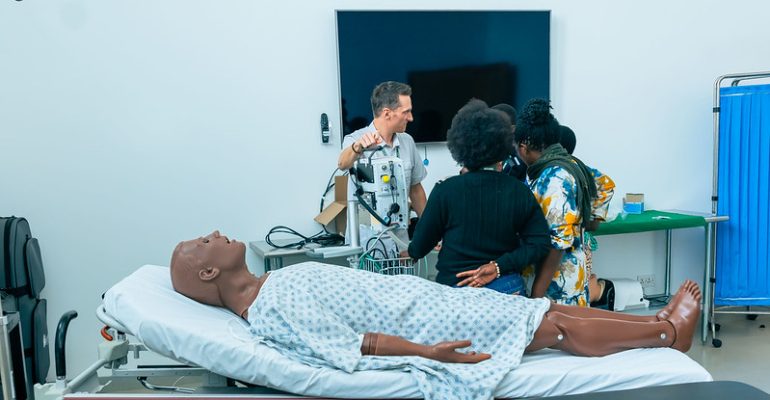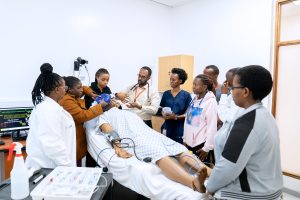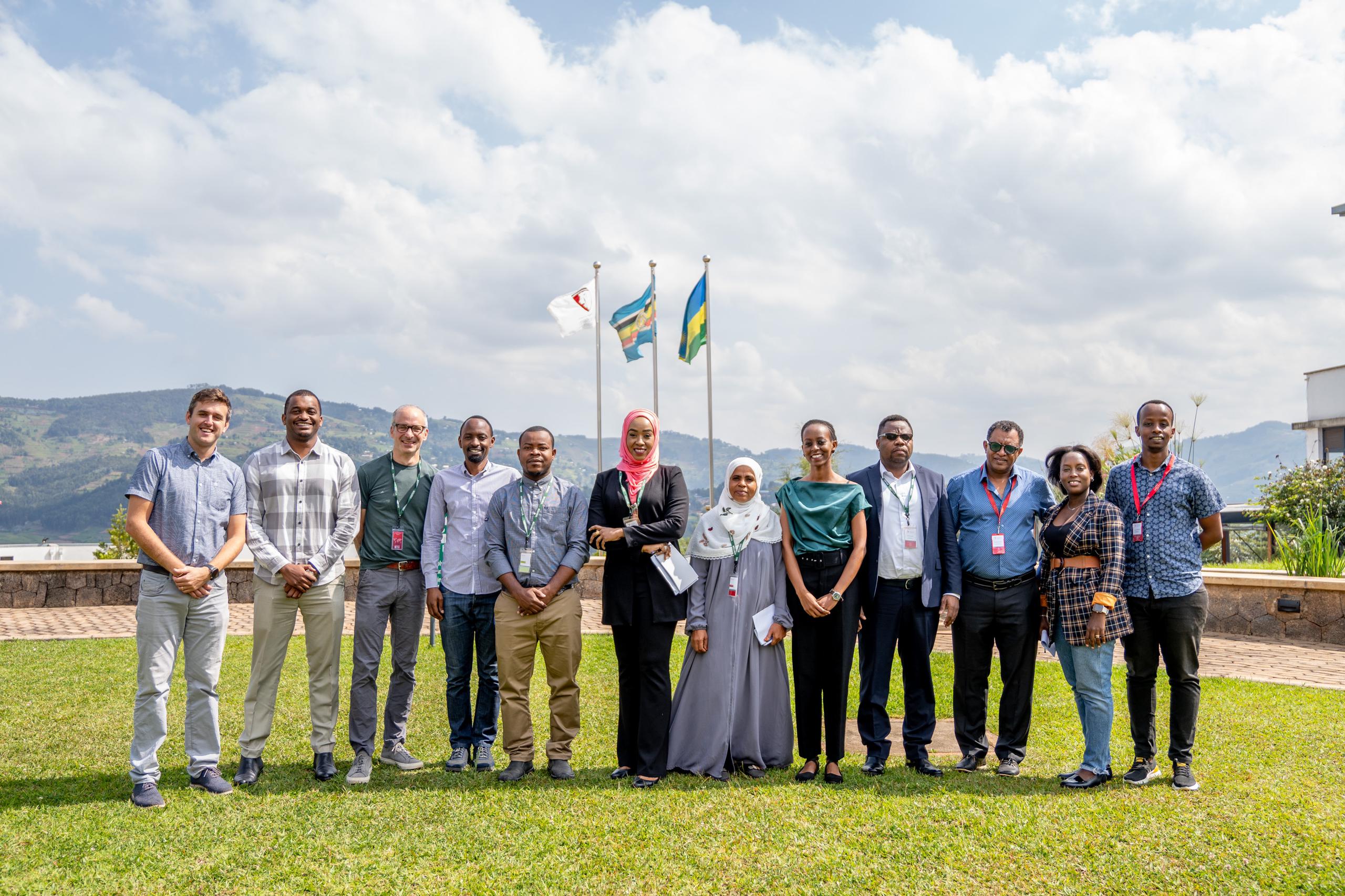Delivering Hands-on Experience to Global Health Leaders: The State-of-the-Art Simulation and Skills Centre
November 7, 2024 2025-08-20 8:19Delivering Hands-on Experience to Global Health Leaders: The State-of-the-Art Simulation and Skills Centre

Delivering Hands-on Experience to Global Health Leaders: The State-of-the-Art Simulation and Skills Centre
Medical errors are a significant concern globally, significantly impacting patient safety. According to the World Health Organisation, around 1 in every 10 patients is harmed while receiving health care. These errors, including misdiagnoses, surgical errors, and unsafe injection practices, have led to deaths or lifelong injuries. In developing countries, unsafe care causes the death of up to 4 out of every 100 patients, with nearly 50% of these deaths being preventable (WHO, 2023). Their economic impact is substantial due to extended hospital stays, additional treatments, and lost productivity. Addressing medical errors is crucial not only to improve patient outcomes but also to reduce unnecessary healthcare costs worldwide.
One of the possible ways to prevent medical errors is by training healthcare providers through Simulation-Based Education (SBE), which allows learners to practice and refine clinical skills and attitudes in a safe and controlled environment that mimics clinical scenarios.
SBE use manikins, standardized patients and simulation technologies, to provide clinicians with immersive learning experiences in a dedicated simulation space (simulation centre) or within actual hospital settings (Elendu et al., 2024).
However, simulation centers are limited in Sub Saharan Africa. According to Society for Simulation in Healthcare, only 7 of them are in Africa. The University of Global Health Equity is among the few universities that has invested in a state-of-the-art Simulation Centre in the East African Region.
The UGHE’s Simulation and Skills Centre is at the heart of the institution’s mission to advance healthcare education in Rwanda and beyond. Since its launch in 2019, the center has rapidly become a cornerstone of healthcare education in rural Rwanda. Through cutting-edge technology, innovative training programs, and strategic partnerships, the center equips medical students and health professionals with the knowledge and skills they need to improve healthcare delivery.
The UGHE Simulation and Skills Centre focuses its activities on three main pillars, each adapted to specific groups within the healthcare community:
1. Simulation training for undergraduate medical students
SBE is fully integrated into both the Basic Medical Sciences and Clinical Curricula at UGHE, ensuring that students benefit from experiential learning throughout their education. From preclinical years, where foundational medical knowledge is applied in simulated environments, to the later clinical years, where students tackle complex medical emergencies, the Centre provides an invaluable platform for developing essential clinical skills.

Students gain invaluable skills in the Simulation and Skills Centre. On the picture: Dr. Masimbi and Dr. Solomon teaching medical students in a skill session. Photo by Asher Habinshuti/PIH
Students engage with basic and advanced simulation technology to practice critical procedures such as delivering babies, managing trauma cases, and providing basic life support. This experience not only builds their clinical competence but also instills confidence as they prepare to enter medical practice.
2. Simulation Instructor Training for health professional educators
The center also plays a pivotal role in capacity building among health professionals’ educators. In partnership with Immersive Design Systems, a renowned center at Boston Children’s Hospital, UGHE’s SIM Centre provides advanced annual training in simulation scenario design, delivery, and debriefing to its faculty, and educators from partner institutions.

Over the past five years, the Centre has trained more than 100 instructors from various institutions, including the University of Rwanda, Butaro Level Two Teaching Hospital (BL2TH), King Faisal Hospital, Rwanda Military Referral and Teaching Hospital, East African Christian College and the State University of Zanzibar. By strengthening local capacity for SBE (Simulation-Based Education), UGHE is contributing to the long-term sustainability of high-quality healthcare training in the East African Region.
3. Capacity Building for Healthcare Providers
Beyond medical students’s training, the Centre plays a crucial role in enhancing the skills of practicing health professionals. Through a range of capacity-building workshops, doctors, nurses, and anesthetists from public hospitals across Rwanda participate in specialized training that addresses critical healthcare needs. Courses such as Basic Life Support, Advanced Trauma Life Support, and mechanical ventilation training have improved the skills of hundreds of health professionals working in demanding medical settings.

State-of-the-Art Simulation facilities and equipment
The UGHE Simulation and Skills Centre is equipped with state-of-the-art medical simulation tools, including high-fidelity manikins, a cardiology patient simulator, Anatomage© tables, ventilators, an anesthesia machine and several task trainers for Cardiopulmonary resuscitation (CPR), urinary catheterization, intubation, and more.
In addition, the simulation rooms at the center are designed to replicate real clinical settings such as emergency departments, intensive care units and operating rooms. This enables the Centre to simulate a wide range of medical scenarios in a safe and controlled environment, for better practice.

A hub for collaboration
The Simulation Center is not just focused on internal simulation activities; it is actively engaged in collaboration with other medical institutions across Rwanda. Together with skills labs and hospitals in Rwanda, the centre is working to establish the “Rwanda Healthcare Simulation Network”, a national initiative aimed at promoting collaboration among simulation facilities. This network will enable health professionals’ educators and providers across the country to work together, share best practices, and collectively advance the quality of healthcare training in Rwanda.
Furthermore, the UGHE’s SIM Centre is expanding its reach beyond Rwanda. In 2023, the Centre began supporting the simulation program at the State University of Zanzibar (SUZA), marking a significant step in spreading high-quality healthcare education across East Africa.

Achievements and impact:
Since its launch, the Simulation Centre has trained more than 250 trainees (MBSS students & healthcare professionals) and delivered over 90 unique training sessions. These numbers reflect the it’s growing influence on healthcare education in Rwanda and beyond.
In recognition of its contributions, the UGHE’s Simulation and Skills Centre was awarded the 2023 ASPIRE Certificate of Merit in Simulation by the Association for Medical Education in Europe, which solidified its reputation as the leading center in SBE (Simulation-Based Education) in the region.
The UGHE Simulation and Skills Centre remains committed to advancing healthcare education and improving patient outcomes in Rwanda and Africa. Through its focus on health professionals training and instructor development, the Centre is shaping the future of healthcare in the region.
Related Posts
Search
Archives
- February 2026
- January 2026
- December 2025
- November 2025
- October 2025
- September 2025
- August 2025
- July 2025
- June 2025
- February 2025
- November 2024
- October 2024
- September 2024
- August 2024
- July 2024
- May 2024
- April 2024
- March 2024
- February 2024
- January 2024
- December 2023
- November 2023
- October 2023
- September 2023
- August 2023
- July 2023
- June 2023
- May 2023
- April 2023
- March 2023
- February 2023
- January 2023
- December 2022
- November 2022
- October 2022
- September 2022
- August 2022
- July 2022
- June 2022
- May 2022
- April 2022
- March 2022
- February 2022
- January 2022
- December 2021
- November 2021
- October 2021
- September 2021
- August 2021
- July 2021
- June 2021
- May 2021
- April 2021
- March 2021
- February 2021
- January 2021
- December 2020
- November 2020
- October 2020
- September 2020
- August 2020
- July 2020
- June 2020
- May 2020
- April 2020
- March 2020
- February 2020
- January 2020
- December 2019
- November 2019
- October 2019
- September 2019
- August 2019
- July 2019
- May 2019
- April 2019
- March 2019
- February 2019
- January 2019
- December 2018
- November 2018
- October 2018
- September 2018
- August 2018
- June 2018
- May 2018
- April 2018
- March 2018
- February 2018
- January 2018
- December 2017
- November 2017
- October 2017
- September 2017
- August 2017
- July 2017
- June 2017
- May 2017
- April 2017
- February 2017
- January 2017
- December 2016
- November 2016
- October 2016
- September 2016
- August 2016
- July 2016
- May 2016
- February 2016
- October 2015
- September 2015
- June 2015







